| 29 August |
• yesterday • tomorrow |
| Memorial of The Passion of Saint John the Baptist (red) |
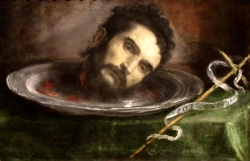
• Iohannes Baptista
• Joannes Baptista
• John the Baptizer
• John the Forerunner
• John, son of Zachary
• Juan Bautista
• Yochanan ben Zecharyah
• 24 June (birth)
• 29 August (death)
Cousin of Jesus Christ. Son of Zachary, a priest of the order of Abia whose job in the temple was to burn incense; and of Elizabeth, a descendent of Aaron. As Zachary was ministering in the Temple, an angel brought him news that Elizabeth would bear a child filled with the Holy Spirit from the moment of his birth. Zachary doubted and was struck dumb until John's birth.
Prophet. John began his ministry around age 27, wearing a leather belt and a tunic of camel hair, living off locusts and wild honey, and preaching a message of repentance to the people of Jerusalem. He converted many, and prepared the way for the coming of Jesus. He Baptized Christ, after which he stepped away and told his disciples to follow Jesus.
Imprisoned by King Herod. He died a victim of the vengeance of a jealous woman; he was beheaded, and his head brought to her on a platter. Saint Jerome says Herodias kept the head for a long time after, occasionally stabbing the tongue with his dagger because of what John had said in life.
• beheaded c.30 at Machaerus
• buried at Sebaste, Samaria
• relics in Saint Sylvester's church, Rome, Italy, and at Amiens, France
• against convulsions or spasms
• epileptics and against epilepsy
• against hail and hailstorms
• baptism
• bird dealers
• converts
• convulsive children
• cutters
• farriers
• French Canadians
• innkeepers
• lambs
• monastic life
• motorways
• printers
• tailors
• Jordan
• Puerto Rico
• Knights Hospitaller
• Knights of Malta
• 13 dioceses
• 69 cities
• cross in hand
• lamb
• severed head on a platter
• skin of an animal
• slender cross
• tall, thin cross
There is no doubt that blessed John suffered imprisonment and chains as a witness to our Redeemer, whose forerunner he was, and gave his life for him. His persecutor had demanded not that he should deny Christ, but only that he should keep silent about the truth. Nevertheless, he died for Christ. Does Christ not say: "I am the truth"? Therefore, because John shed his blood for the truth, he surely died for Christ. Through his birth, preaching and baptizing, he bore witness to the coming birth, preaching and baptism of Christ, and by his own suffering he showed that Christ also would suffer. Such was the quality and strength of the man who accepted the end of this present life by shedding his blood after the long imprisonment. He preached the freedom of heavenly peace, yet was thrown into irons by ungodly men. He was locked away in the darkness of prison, through he came bearing witness to the Light of life and deserved to be called a bright and shining lamp by that Light itself, which is Christ. To endure temporal agonies for the sake of the truth was not a heavy burden for such men as John; rather is was easily borne and even desirable, for he knew eternal joy would be his reward. Since death was ever at hand, such men considered it a blessing to embrace it and thus gain the reward of eternal life by acknowledging Christ's name. Hence the apostle Paul rightly says: "You have been granted the privilege not only to believe in Christ but also to suffer for his sake." He tells us why it is Christ's gift that his chosen ones should suffer for him: "The sufferings of this present time are not worthy to be compared with the glory that is to be revealed in us." - from a homily by Saint Bede the Venerable on the death of John the Baptist
Herodias harbored a grudge against him and wanted to kill him but was unable to do so. Herod feared John, knowing him to be a righteous and holy man, and kept him in custody. When he heard him speak he was very much perplexed, yet he liked to listen to him. She had an opportunity one day when Herod, on his birthday, gave a banquet for his courtiers, his military officers and the leading men of Galilee. Herodias's own daughter came in and performed a dance that delighted Herod and his guests. The king said to the girl, "Ask of me whatever you wish and I will grant it to you." She went out and said to her mother, "What shall I ask for?" She replied, "The head of John the Baptist." The girl hurried back to the king's presence and made her request, "I want you to give me at once on a platter the head of John the Baptist." The king was deeply distressed, but because of his oaths and the guests he did not wish to break his word to her. So he promptly dispatched an executioner with orders to bring back his head. He went off and beheaded him in the prison. He brought in the head on a platter and gave it to the girl. The girl in turn gave it to her mother. When his disciples heard about it, they came and took his body and laid it in a tomb. - Mark 6:19-29
https://catholicsaints.info/saint-john-the-baptist/
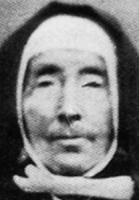
• Marie de la Croix
• Marie of the Cross
Born in a small, impoverished fishing village. Her father was a fisherman named Joseph who was gone to sea most of the time, and died when Jeanne was 4 years old. Her mother was named Marie, did farm work to support her family, and raised the children in the Faith during the time of the French Revolution when Christianity was being suppressed.
At sixteen Jeanne got a job as a maid at the estate of a Christian woman who often visited the sick and poor, and took Jeanne along to help. This experience, her employer's example, and Jeanne's own relationship with God prompted her to decline marriage proposals, and dedicate her life to God.
At twenty-five Jeanne gave away most of her meager possessions, and set out to serve the poor of Saint Servan. She supported herself by working in a hospital and caring for the sick and poor. Six years of this left Jeanne exhausted. She left the hospital, and returned to work as a domestic.
At age forty-five she began to work as a spinner, and donated her excess money to the poor. After two years, she set off to devote every aspect of her life to the poor. She collected money door to door, and began to especially care for poor widows. Jeanne attracted followers to this work, the Little Sisters of the Poor were founded under her direction, and Jeanne served as superior.
Awarded by the French Academy in 1845 for her work with the poor. Jeanne was eventally removed from her position as superior by Father La Pailleur, the Sisters's spiritual moderator. She retired to the group's motherhouse in 1852 where she lived her remaining years, a humble sister, doing works of charity wherever she could.
25 October 1792 at Les Petites-Croix, Cancale, d'Ille-et-Vilaine, Brittany, France
• 29 August 1879 at Saint-Pern, d'Ille-et-Vilaine, Bretagne, France of natural causes
• buried at the Motherhouse of Little Sisters of the Poor at Saint-Pern
11 October 2009 by Pope Benedict XVI
Little Sisters, take good care for the aged, for in them you are caring for Christ Himself. - Saint Jeanne Jugan
https://catholicsaints.info/saint-jeanne-jugan/
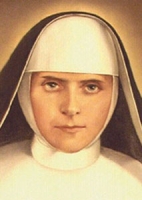
Youngest of five children, the only daughter of Augustine and Mary Duchalska. After high school Janina studied languages and foreign literature at the University of Poznan, Poland. Member of the Sodality of Mary, she was known for her personal interest in anyone and everyone with a problem, and for her work with the poor. She early felt a call to religious life, and during a pilgrimage to Lourdes, France in the summer of 1934, she gave herself over to the hands of the Blessed Virgin Mary. She spent a year with the Congregation of the Oblate Sisters of the Sacred Heart at Montluçon, France, then returned to Poznan in June 1936 and joined the Daughters of the Sorrowful Mother of God (Seraphic Franciscan Sisters), receiving the name Maria Sancja. Known for her strict adherence to her Order's rule, and for cheerfully volunteering for any kind of service, she made her first vows on 30 July 1938. Worked for a year in the nursery school of Poznan-Naramowice, and began to study pharmacology, but the outbreak of World War II in September 1939 put an end to her studies. Poznan was occupied by the Germans, the Sisters were place under house arrest, and then ordered to care for German soldiers and English and French prisoners of war. Because of her language studies, Sister Sancja served as translator for the prisoners as well as doing all the other forced labour ordered by the Germans. Worn down by the work, she contracted tuberculosis, but was able to make her solemn vows on 6 July 1942, a few weeks before her death.
10 July 1910 in Mozdzanów, Wielkopolskie, Poland as Janina Szymkowiak
29 August 1942 in Poznan, Wielkopolskie, Poland of tuberculosis of the pharynx
18 August 2002 by Pope John Paul II at Krakow, Poland
God's will is my will. Whatever he wants I want. - Blessed Sancja's personal motto
https://catholicsaints.info/blessed-sancja-szymkowiak/
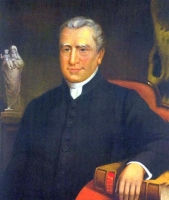
• Ignatius Rice
• Edmund Ignatius Rice
The fourth of seven sons born to pious farm family during a time of oppression of Irish Catholics by the English. He became wealthy working with his uncle's shipping business. He married Mary Elliott in 1787, was the father of one daughter, and became a widower in 1789. In his search for meaning after this loss he began working with poor, uneducated boys. Founder of the Congregation of Christian Brothers and the Congregation of Brothers of the Presentation (Irish Christian Brothers) in Waterford, Ireland in 1802. The Brothers continue their work today in England, Ireland and Australia, and are well-represented online.
1 June 1762 in Westcourt, Callan, County Kilkenny, Ireland
29 August 1844 at Mount Sion, Waterford, Ireland of natural causes
6 October 1996 by Pope John Paul II
Trusting in God's help, I hope to be able to educate these boys to be good Catholics and good citizens. - Blessed Edmund
Here we have an outstanding model of a true lay apostle. - Pope John Paul II
https://catholicsaints.info/blessed-edmund-rice/
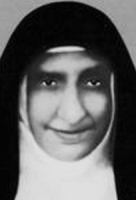
• Euphrasia of the Sacred Heart
• Rosa Eluvathingal
• Mother Euphrasia
Nun in the Congregation of the Mother of Carmel, taking the name Eufrasia of the Sacred Heart of Jesus.
7 October 1877 in Edathuruthy, Thrissur, Kerala, India as Rosa Eluvathingal
29 August 1952 in Ollur, Thrissur, Kerala, India of natural causes
• 23 November 2014 by Pope Francis
• his canonization miracle involved the healing in 2006 of a thyroglossal cyst on a 7-year-old boy named Jewel
https://catholicsaints.info/saint-eufrasia-of-the-sacred-heart-of-jesus-eluvathingal/
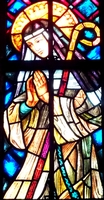
• Bronislava Odrowaz
• Bronislava of Cracow
• Bronislawa...
Daughter of Count Stanislaus and Countess Anna of Prandata-Odrowaz; related to Saint Hyacinth and Blessed Czeslaw. Premonstratensian nun. Hermitess. When Saint Hyacinth died, Bronislava had a vision of Mary welcoming him to heaven.
1200 at Kamien, Lubelskie, Poland as Bronislawa Odrowaz
• 29 August 1259 at Zwierzyniec, Lubelskie, Poland of natural causes
• re-interred in her convent church in 1261
• the church was later destroyed and her relics lost during a Swedish invasion
• relics re-discovered in the 17th century
23 August 1839 by Pope Gregory XVI (cultus confirmed)
https://catholicsaints.info/blessed-bronislava-of-poland/
Brother of Blessed Alfredo Almunia López-Teruel. After studying at the seminary of San Indalecio de Almería, José was ordained a priest in the diocese of Almería, Spain on 23 June 1893. Parish priest, and supporter of the group Daughters of Mary. He earned a doctorate in theology in 1894, a degree in canon law in 1906, and a degree in civil law in 1909. Teacher. Martyred in the Spanish Civil War.
18 March 1870 in Tíjola, Almería, Spain
shot 30 times on 29 August 1936 in El Abriojal, Rioja, Almería, Spain
• 25 March 2017 by Pope Francis
• beatification celebrated in the Palacio de Exposiciones y Congresos de Aguadulce, Almería, Spain, presided by Cardinal Angelo Amato
https://catholicsaints.info/blessed-jose-almunia-lopez-teruel/
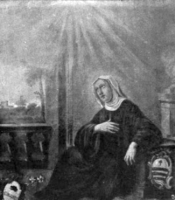
Felipa Guidoni
Born to the nobility of Arezzo, Italy. Benedictine Santuchan (later Servents of Mary) nun. Spiritual student of the founder of the Santuchans, Blessed Santuccia Terrebotti. Founded the Santa Maria de Valverde abbey in Arezzo, and served as its first abbess.
• 29 August 1335 of natural causes
• interred in the Santa Maria de Valverde abbey, Arezzo, Italy
• relics transferred to the Holy Spirit monastery in 1520 when her community moved there
• relics transferred and re-enshrined when the Holy Spirit monastery was converted into a mental hospital
has not been formally beatified, but devotion started immediately after her death
https://catholicsaints.info/blessed-filippa-guidoni/
• Richard Hurst
• Richard Hayhurst
Layman land owner of Preston in Lancaster in the apostolic vicariate of England. During the persecutions of Catholics by King James I, three Protestant subjects were sent to arrest Richard, who was working in his fields at the time. Richard's farm workers convinced him to run; one of the men sent to arrest him gave chase, fell, broke a leg, and several days later died as a result of the injury; Richard was charged with his murder. He was offered his freedom if he would swear allegience to the king as head of the Church, and become a Protestant; he declined. Martyr.
Lancashire, England
hanged on 29 August 1628 in Lancaster, Lancashire, England
15 December 1929 by Pope Pius XI
https://catholicsaints.info/blessed-richard-herst/
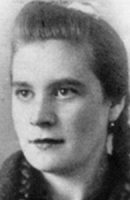
Born to Giacomo Bracco and Anna Pera, two humble and devoutly Catholic farmers. A pious child, she early developed a devotion to the Eucharist and the Virgin Mary; as she grew older would go into ecstatic trances while staring at the Blessed Sacrament. Went to Mass daily, and prayed her rosary while doing daily chores. Murdered by a Nazi officer who was trying to rape her.
24 February 1924 in Santa Giulia, Dego, Savona, Italy
shot on 28 August 1944 in the woods near Santa Giulia, Dego, Savona, Italy
24 May 1998 by Pope John Paul II
I would rather be killed than give in. - Blessed Teresa's personal life motto
https://catholicsaints.info/blessed-teresa-bracco/
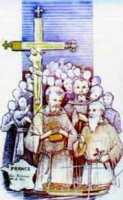
Priest in the diocese of Limoges, France. Imprisoned on a ship in the harbor of Rochefort, France and left to die during the anti-Catholic persecutions of the French Revolution. One of the Martyrs of the Hulks of Rochefort.
1 April 1767 in Rue, Somme, France
29 August 1794 aboard the prison ship Deux-Associés, in Rochefort, Charente-Maritime, France
1 October 1995 by Pope John Paul II
https://catholicsaints.info/blessed-louis-wulphy-huppy/
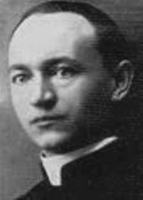
12 June as one of the 108 Martyrs of World War II
Priest of the diocese of Wloclawek, Poland. Deported, imprisoned, tortured and martyred in the Nazi persecutions of World War II.
4 August 1886 in Kowal, Kujawsko-Pomorskie, Poland
29 March 1942 in the Dachau concentration camp, Oberbayern, Germany
13 June 1999 by Pope John Paul II in Warsaw, Poland
https://catholicsaints.info/blessed-dominik-jedrzejewski/

Adelfo, Adelfus, Adelphe, Adelphus
Tenth bishop of Metz, France, serving for 17 years, bringing many pagans in the region to Christianity.
c.400
• 5th century, location unknown, of natural causes
• buried in Metz, France
• relics moved to Neuweiler, Alsace, France in 836
3 December 1049 by Pope Leo IX
https://catholicsaints.info/saint-adelphius/
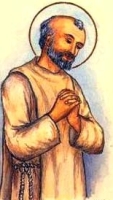
Alberico
Born to the wealthy Italian nobility. Lived as a prayerful hermit in the valley of Sant Anastasio. Monk at Bagno de Romagna, Sarcina, Italy. Hermit on Mount Fumaiolo where he associated with the Camaldolese monasterys near Bagno di Romagna, Italy.
Ravenna, Italy
c.1050 at Sarsina, Forli, Italy of natural causes
https://catholicsaints.info/saint-alberic-of-bagno-de-romagna/
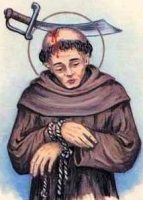
Franciscan friar. In 1216, he and Blessed John of Perugia were sent by Saint Francis of Assisi to preach to the Spanish Moors in and around Teruel and Valencia, Spain. Martyr.
beheaded in 1231 in Valencia, Spain
• 11 September 1704 by Pope Clement XI (cultus confirmed)
• 1783 by Pope Pius VI (cultus confirmed)
https://catholicsaints.info/blessed-peter-of-sassoferrato/
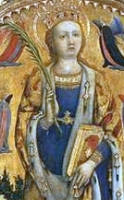
Wealthy widow in Rome, Italy. Converted to Christianity by her Syrian servant Serapia. Serapia was martyred, and Sabina about a month later. Basilica on the Aventine in Rome named for her, and her cultus is confined to it.
• 126 in Rome, Italy
• relics enshrined in 430 in the Basilica of San Sabina on the Via Aventine in Rome
Avezzano, Italy, diocese of
https://catholicsaints.info/saint-sabina-of-rome/
Sebba, Sebbi, Sebbo
King of Essex in England, ascending in 664. Founded the monastery of Westminster. Known for his personal piety, charity and prayer life while still on the throne. After a peaceful 30 year reign, he abdicated to spend his later years as a prayerful monk at Westminster.
• 697
• relics enshrined in Saint Paul's Cathedral in London, England
• relics destroyed in the great fire of London in 1666
https://catholicsaints.info/saint-sebbe-of-essex/
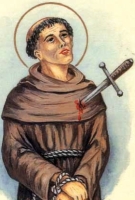
Franciscan friar. In 1216, he and Blessed Peter of Sassoferrato were sent by Saint Francis of Assisi to preach to the Spanish Moors in and around Teruel and Valencia, Spain. Martyr.
beheaded in 1231 in Valencia, Spain
• 11 September 1704 by Pope Clement XI (cultus confirmed)
• 1783 by Pope Pius VI (cultus confirmed)
https://catholicsaints.info/blessed-john-of-perugia/
Satyrus
1 September as one of the Twelve Holy Brothers
Martyred in the persecutions of Maximian Herculeaus.
• c.303 at Velleianum, Italy
• relics enshrined in Benevento, Italy in 760
https://catholicsaints.info/saint-sator-of-velleianum/
1 September as one of the Twelve Holy Brothers
Martyred in the persecutions of Maximian Herculeaus.
• c.303 at Velleianum, Italy
• relics enshrined in Benevento, Italy in 760
https://catholicsaints.info/saint-repositus-of-velleianum/
1 September as one of the Twelve Holy Brothers
Martyred in the persecutions of Maximian Herculeaus.
• c.303 at Velleianum, Italy
• relics enshrined in Benevento, Italy in 760
https://catholicsaints.info/saint-vitalis-of-velleianum/
Merry, Mederico
Monk at Saint Martin's Abbey in Autun, France; he was later chosen abbot there. Hermit near Paris, France; the church of Saint-Merry now stands on the site of his hermitage.
Autun, France
c.700
https://catholicsaints.info/saint-medericus/
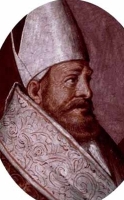
Fifth-century bishop of Vercelli, Italy.
478 in Vercelli, Italy
https://catholicsaints.info/saint-maximian-of-vercelli/
Married layman. Father of Saint Crescentius. During the persecutions of Diocletian he and his family fled Rome to Perugia, Italy.
4th century in Perugia, Italy
https://catholicsaints.info/saint-euthymius-of-perugia/
Missionary to Germany with Saint Swithbert. Abbot of the Benedictine monastery at Werth on the Rhine (modern Düsseldorf-Kaiserswerth, Germany) in the early 8th century.
British Isles
https://catholicsaints.info/saint-velleicus/
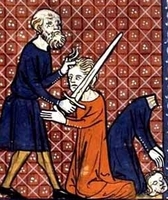
Sister of Saint Sabinian of Troyes.
c.275
https://catholicsaints.info/saint-sabina-of-troyes/
Martyr.
• on the Ostian Way outside of Rome, Italy
• relics enshrined in the church of Saint Praxedes in Rome
https://catholicsaints.info/saint-candida-of-rome-2/
Seventh century hermit who built and lived in a small chapel at La Chambon, Nantes, Brittany, France.
https://catholicsaints.info/saint-victor-of-la-chambon/
May have been the brother of Saint Edmund the Martyr. Ninth-century hermit at Cerne, Doresetshire, England.
https://catholicsaints.info/saint-edwold-the-hermit/
Martyr.
c.300 in Sirmium, Pannonia (modern Sremska Mitrovica, Serbia)
https://catholicsaints.info/saint-basila-of-sirmium/
Adavisa
Martyred in Rome, Italy.
https://catholicsaints.info/saint-adausia-of-rome/
Martyr.
Antioch, Syria
https://catholicsaints.info/saint-nicaeus-of-antioch/
Martyr.
Antioch, Syria
https://catholicsaints.info/saint-paul-of-antioch/
Thousands of people were murdered in the anti-Catholic persecutions of the Spanish Civil War from 1934 to 1939. I have pages on each of them, but in most cases I have only found very minimal information. They are available on the CatholicSaints.Info site through these links:
• Blessed Constantino Fernández álvarez
• Blessed Josep Maria Tarín Curto
• Blessed Pedro Asúa Mendía
• Our Lady of Tears
• Our Lady of the Guard
• Beatrice of Nazareth
• Ferdinando de Incapié
• Pietro Romero
• Verona of Mainz
CatholicSaints.Info Portable Edition